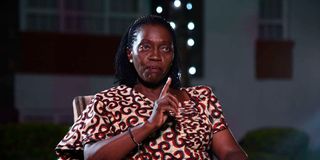NTV gets scooped on the Karua family interview, but who cares?

Narc Kenya party leader and Azimio presidential running mate Martha Karua during an interview at her home in Gigigiri on May 16, 2022.
What you need to know:
- NTV failed to give its viewers the emotional half of the story about Ms Karua as a running mate.
- Viewers missed out on the moving details of “uchungu wa mwana aujuaye ni mzazi”.
On Monday, the competition scooped NTV with the story of how Martha Karua’s family welcomed her win as the running mate for Raila Odinga. But do readers care about scoops?
In journalism, a scoop is an item of news reported by one media before others. A good scoop should be exciting and of interest to many people. News organisations try to get as many scoops as possible.
Scoops give them prestige and perceived value. When a news organisation manages to get a scoop — a major story ahead of others — it’s said to have scooped the competition. It earns bragging rights.
When I was a reporter, a scoop was a big deal. Then there were no computers, smart phones, or internet. And there was only one broadcaster (owned by the state). Newspapers could only be read the following day and a scoop was real and lasted for at least 24 hours.
Today, a scoop lasts only a few hours, even minutes, before other media pick it up, repeat it, and rebroadcast it. It ceases to be a scoop, as news has no copyright — only the way it’s expressed or reported.
Both Citizen and KTN interviewed Ms Karua’s parents and siblings at their home in Kimunya village, Kirinyaga County, immediately after she was elevated to the position of a presidential running mate. The interviews made NTV look like a sleepy performer, an embarrassment to its viewers.
Reactionary story
Actually, NTV was not sleeping. They were fully aware of the importance of the interview as a reactionary story — the emotional side of the actual Martha Karua’s rise to prominence. NTV Jioni proved this.
Swahili news anchor Salim Swaleh gave NTV viewers a smattering of what went on at Kimunya. He told viewers there is a Swahili saying that “uchungu wa mwana aujuaye ni mzazi” (the pain of a child, it’s only a parent who understands best). He then proceeded to screen a 51-second clip showing Ms Karua’s parents discussing their daughter. The clip however — it was too obvious to viewers — featured a KTN microphone. The actual KTN story was 12.40 minutes long.
The need for the reactionary story was obvious. NTV was well aware of this. Earlier, on Saturday, reporter Ngina Kirori journeyed north to interview Kithure Kindiki’s parents at their home in Mukothima, Tharaka Nithi County, when it appeared like he could be the winner of the contest for the presidential running mate for Deputy President William Ruto.
One may be forgiven to imagine NTV did send a reporter to interview the family of Ms Karua. But the reporter drowned while crossing the swollen Nyamindi River at Kiamutugu in Gichugu. But then again that could have been a story in itself, which NTV didn’t tell.
Broadcast journalists, NTV reporters included, instinctively know reaction is an important part of such a story. A reaction story tells the emotional side of the actual story. It touches our soul, and makes us smile, laugh, cheer, cry, or scream.
Family reaction
The best illustration of the importance of reaction stories is spectator sports. When, for example, Harambee Stars striker Michael Olunga scores a goal the reaction of the crowd and his team mates is as important as the goal.
By not doing the family reaction story, NTV failed to give its viewers the emotional half of the story about Ms Karua as a running mate. Viewers missed out on the moving details of “uchungu wa mwana aujuaye ni mzazi”, so authoritatively told by her parents and brother.
Mr Jackson Karua, the doting father who has the booming voice of a radio announcer, said Martha’s brilliance runs in the family. The mother, bespectacled Josephine Wanjiru was fervently religious as she talked of her daughter’s upbringing.
The brother, Jefta Nyaga, told the story of his sister deeply with a soulful voice. He appeared to be the family philosopher. There was also the family album to behold, with Ms Karua shown as the little girl who showed leadership qualities early in life.
That was the power of a reaction story. Viewers may know only about a scoop of githeri or ice cream. But they enjoy a good reactionary story that stirs the soul.
The Public Editor is an independent news ombudsman who handles readers’ complaints on editorial matters including accuracy and journalistic standards. Email: [email protected]. Call or text 0721989264.





